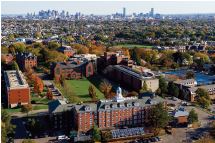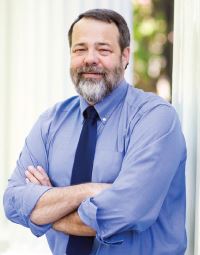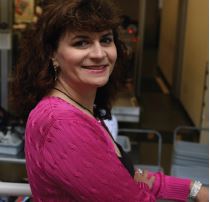Featured Q & A with Tufts University, Graduate School of Arts & Sciences and the School of Engineering
PrEsented by our partner Schools
 Featured Q & A with Tufts University, Graduate School of Arts & Sciences and the School of Engineering
Featured Q & A with Tufts University, Graduate School of Arts & Sciences and the School of Engineering
What are the advantages of studying and living in Boston?
Tufts is located just five miles outside of Boston, a vibrant metropolitan city rich in history and cultural resources. In fact, in 2014 Forbes magazine ranked Boston ninth among the 20 coolest cities in America. Boston is a center of scholarly inquiry and learning, with nine research universities and 60 higher education institutions in its vicinity. Through courses offered at other institutions and the use of Boston’s libraries, labs, and centers, graduate students are easily integrated into the academic fiber of this intellectual city.
Our beautiful campus in Medford/Somerville—just a few miles away from Boston proper—offers the perfect combination of residential and city living. Convenient transportation and reasonable housing costs allow graduate students to have the best of both worlds. Somerville’s Davis Square, just down the hill from campus, boasts an array of stores, clubs, restaurants, entertainment options, and a subway stop which provides easy access to Boston, Cambridge, and other points of interest.on teaching students how to be socially responsible practitioners through community engagement, social justice advocacy, field training, and classroom interactions with highly specialized professors who are also practitioners. Our sport and health psychology specialization is the only master’s program of its kind that results in a dual credential leading to eligibility as a licensed clinician and a certified sport psychology consultant (CC-AASP).
Students will learn the skills to practice as licensed clinicians, and also work with athletes, exercisers, and people interested in health and wellness. Students benefit from sport and health psychology coursework that aligns with the Association for Applied Sport Psychology’s (AASP) C1-C12 requirements, and a sport and health psychology externship.
Describe your diversity initiatives.
Our graduate programs bring together individuals from varied backgrounds and nationalities to create a rich and diverse culture in which you’ll find a genuine, supportive community. We believe that the diversity of our graduate students deeply enriches our community. A diverse student body is fundamental to our academic mission to provide multiple views and perspectives that enhance the teaching, research, and development of new knowledge. In addition to promoting academic and research diversity, our mission is also to achieve cultural diversity by creating a welcoming academic and social environment for all students. We have a vibrant international center and many resources to support a diverse student body
About Tufts University GSAS and the School of Engineering
The Graduate School of Arts and Sciences and the School of Engineering offer more than 60 doctoral and master’s degrees, including a number of interdisciplinary degrees and partnerships with other universities. Our certificate programs provide flexibility and an opportunity to refresh your skills or refocus your career.
Promoted Content
 Featured Q & A with Tufts University, Graduate School of Arts & Sciences
Featured Q & A with Tufts University, Graduate School of Arts & Sciences
Robert Cook, Dean, GSAS Professor, Department of Psychology
Describe the faculty at your school. What level of interaction do professors have with their students?
Tufts graduate students learn from and work side-by-side with Tufts faculty, who are world-class researchers and leading scholars in their fields. They are highly accessible advisors and mentors intent on students’ personal and professional development. Our graduate students have the opportunity to teach and mentor some of the brightest undergraduates in the country.
Having been involved with teaching and research at Tufts for more than twenty years, I know that my colleagues care deeply about the success of each student and work hard to create a learning environment where students thrive.
"At Tufts, you’ll get an intimate education—a very personal experience with faculty and other graduate students—and the opportunity to become a mentor to undergraduates"
Tufts Graduate School of Arts and Sciences offers the teaching and research resources of a major university in one of the leading educational centers in the world. Our collegial learning environment fosters collaboration, as well as opportunities to be involved in meaningful and rigorous interdisciplinary exploration and research.
About Robert Cook
Dr. Cook’s comparative research on animal cognition and behavior—supported by the National Institutes of Health and the National Science Foundation—compares stimulus control, discrimination learning, and memory across animals, including humans.
Promoted Content
 Featured Q & A with Tufts University School of Engineering
Featured Q & A with Tufts University School of Engineering
Karen Panetta, PH.D., Associate Dean for Graduate Education, School of Engineering, Professor of Electrical and Computer Engineering
What areas of research have become the “hallmarks” of your faculty?
The faculty members of Tufts School of Engineering have strength in three cross-cutting strategic areas.
Engineering for Human Health: Research programs include biomedical imaging, regenerative medicine, bioinformatics, waterborne disease, and metabolic engineering.
Engineering for Sustainability: Faculty strengths encompass water and diplomacy, water quality, climate change mitigation, environmental remediation, smart structures, alternative energy, and smart grids.
Engineering the Human/Technology Interface: Collaborative research programs include the development and dissemination of educational technologies, robotics and cognition, sensors, human factors engineering, and big data visualization.
"Graduate students are the heart and the soul of teaching at Tufts. They are a vital part of the university community and integral to everything we do."
Describe the financial aid offered by your school and any specific scholarships.
Tufts School of Engineering offers our top-notch candidates competitive packages. For our doctoral candidates, we recognize and recruit the best incoming students by providing a supplemental stipend for the first three years of the student’s program of study.
In our Department of Computer Science, high-achieving female students are encouraged to apply for the Clare Booth Luce Fellowship which provides a $32,000 annual stipend for two years along with a full-tuition scholarship.
As a member of the National GEM Consortium, Tufts offers students from underrepresented groups paid summer employment, full tuition reimbursement, and fellowships beginning at $20,000.
About Karen Panetta
Dr. Panetta’s research in human visual system modeling and simulation has revolutionized image processing. Herpatented algorithms are used for cancer screening, image enhancement, and airport baggage security. In 2011, President Obama awarded her the nation’s highest award for Engineering, Science and Mathematics Education and Mentoring.
Explore Graduate Programs for You
Explore our featured graduate schools & programs to find those that both match your interests and are looking for students like you.
Best Law Schools
Check out our complete list of 168 law schools, based on surveys of school administrators and over 17,000 students.
Search for Medical Schools
Our medical school search allows you to refine your search with filters for location, tuition, concentrations and more.

Find MBA Programs Matched to Your Interests
Explore our featured business schools to find those that are looking for students like you.


